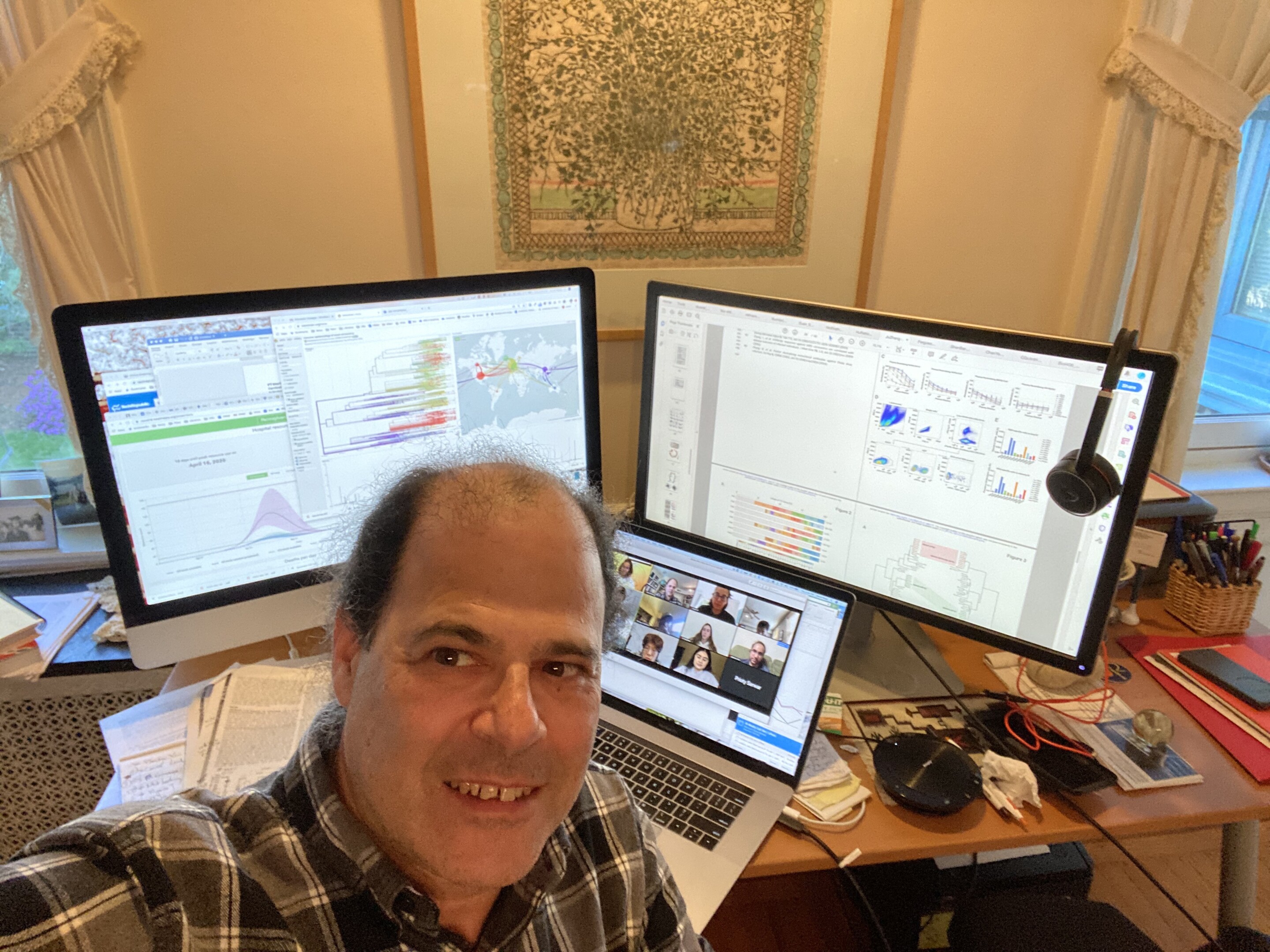
nocred

Biologist David Roos studied influenza as a grad student, and he typically kicks off his advanced course on infectious disease biology with a focus on that virus. That’s how he began this semester, too, with plans to also cover aspects of HIV and malaria.
Then COVID-19 emerged.
“A small silver lining to this dark cloud of the pandemic is that it’s not a bad semester to be taking, or teaching, a class on infectious disease biology and public health,” says Roos, the E. Otis Kendall Professor of Biology in Penn’s School of Arts and Sciences.
In the midst of the campus shutdown that compelled faculty to move their courses online, Roos has also shifted the content of his course, Molecular Mechanisms of Infectious Disease Biology, to encompass what is playing out all around us. Because the approach of the course emphasizes “how to think” rather than how to memorize biological pathways and proteins, says Roos, the scientific approaches students have already learned allow them to consider strategies for discovering, characterizing, and fighting this new disease.
“We had already spent considerable time this semester discussing the cell biology, molecular genetics, evolution, and epidemiology of influenza, including the 1918 pandemic and subsequent outbreaks,” says Roos, “as well as the emergence, spread, and management of HIV.”
From the first weeks of the semester in January, Roos began sharing information with his students about the novel coronavirus in class discussions and suggesting readings and online resources related to the escalating outbreak.
“Even before COVID-19 was really on everyone’s radar,” he says, “we had been challenging ourselves with questions like, ‘Imagine there is a new disease outbreak. What do you look for? What data do you need? How could you obtain this information?’”
Roos has a wealth of experience to inform his teachings, including three decades of laboratory research on the parasites that cause malaria and other diseases and, more recently, the responsibility for supporting genomic datasets for hundreds of parasite and fungal pathogens. Several of his former trainees have gone on to careers in public health, including at the U.S. Centers for Disease Control and Prevention and other government labs, and in the pharmaceutical and biotech sectors. He also directs teams managing a constantly expanding database related to viral and parasite disease (VEuPathDB.org, the Eukaryotic Pathogen, Host & Vector Genomics Resource) and clinical and epidemiological datasets (ClinEpiDB.org).
Transitioning to video conference-style teaching has not posed a major barrier for Roos, whose database group is dispersed around the globe and relies on such technology on a daily basis.
Within several days of the University’s announcement that Penn would be moving classes online for the remainder of the spring semester, Roos sent a note to his students offering an optional online meeting during spring break to smooth out any technological difficulties, to check in to see how they were faring, and to discuss some of the science behind the COVID-19 pandemic.
“Most of our readings this semester focus on primary research literature, so I shared articles on the evolution of coronaviruses than can cause the common cold, previous epidemics like SARS and MERS, and recent preprints on the SARS-CoV-2 virus responsible for COVID-19,” he says.
Recognizing the personal toll of the pandemic, and with many students now home with their families, Roos also invited questions from family members about coronavirus biology, the ongoing pandemic, and public health responses. “I’m not a practicing physician, so I cannot answer medical questions,” says Roos, “but I wanted to do my best to address whatever concerns they may have.”
Abhinav Suri, who graduated from Penn last year with a double major in biology and computer science, is now taking the course remotely from his home in San Antonio as part of the post-baccalaureate Pre-Health Specialized Studies Program. While getting a firsthand view of the pandemic response—his parents are both physicians—Suri, who plans to go to medical school, also appreciates how what he’s been learning has given him a deeper understanding of the scientific approaches to fighting the novel coronavirus.
“The research papers we read and the methodologies we learned in the first part of the class when we were dealing with influenza are coming full circle,” says Suri. “Now we’re talking about things like, How can scientists use these methodologies to make something along the lines of a vaccine or an antiviral for this disease? It’s making our discussions even more relevant to what’s going on in the world today.”
As the pandemic continues—and classes do, too—Roos plans to work in additional readings, discussions, and probably exam questions relating to COVID-19.
“The point I make at the beginning of this class is that in most university courses we do a pretty good job of teaching students the stuff we know,” says Roos. “But we don’t always do a great job of teaching students how scientists figured all that stuff out. With this brand new virus now spreading throughout the world, it’s an important time to learn about the ‘how.’”
Katherine Unger Baillie

nocred

nocred

Despite the commonality of water and ice, says Penn physicist Robert Carpick, their physical properties are remarkably unique.
(Image: mustafahacalaki via Getty Images)

Organizations like Penn’s Netter Center for Community Partnerships foster collaborations between Penn and public schools in the West Philadelphia community.
nocred